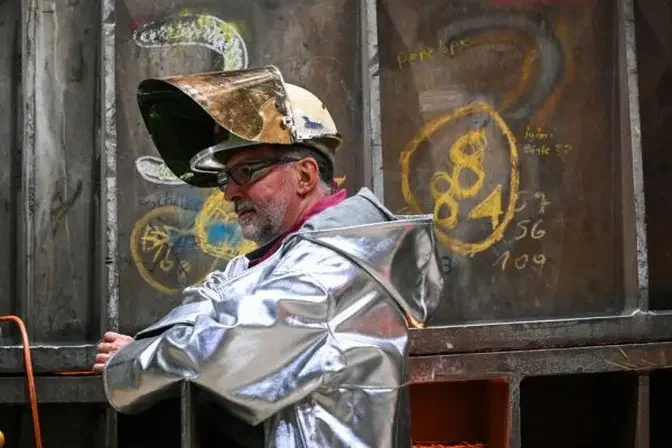In a move aimed at countering what he describes as unfair trade practices, U.S. President Joe Biden proposed a hefty tariff increase on Chinese steel and aluminum. The proposal came on April 17 while he addressed union workers in Pennsylvania. If approved, these imports could see their tariffs “tripled,” he noted.
During his speech at the United Steel Workers headquarters, Biden expressed concerns about China’s trade tactics, particularly in the steel sector. China has been “cheating” in its steel trade practices,” said Biden as he underscored the urgency in which his administration views the need for corrective action.
America first
“For too long, the Chinese government has poured state money into Chinese steel companies, pushing them to make so much steel, as much as possible, subsidized by the Chinese government,” said Biden during the speech. “They’re not competing. They’re cheating. They’re cheating. And we’ve seen the damage here in America.”

Biden also noted that U.S. Trade Representative, Katherine Tai, has been tasked with investigating these practices.
RELATED: Americans Consider China to Be the Greatest Threat to the US, Pew Research Poll
For the best of our weekly content!
You are now signed up for our newsletter
Check your email to complete sign up
Should her findings confirm the suspected anti-competitive behavior, a tripling of tariff rates on steel and aluminum imports may soon be implemented. “If that investigation confirms these anti-competitive trade practices, then I’m calling on her to consider tripling the tariff rates for both steel imports and aluminum imports from China,” said Biden.
“The President of the United States (POTUS) and I take these allegations of the PRC’s non-market policies and practices seriously,” said Tai in a post on X. “I pledge to undertake a full and thorough investigation into our unions’ concerns.”
The president’s strong-worded address reflects the president’s commitment to protecting American jobs and industries, added Tai.
Looking ahead
The call for increased tariffs comes at a time when the Biden administration is intensifying its focus on economic issues across key states ahead of the general election. Biden’s policy proposal aims to curb the economic impact of China’s overproduction, which the administration claims is facilitated by substantial state subsidies. “We’re not going to let that happen again,” said Biden.
Biden’s robust stance on tariffs is also part of a broader effort to rejuvenate American manufacturing and secure blue-collar jobs — particularly in regions like Pennsylvania — where industrial employment plays a crucial economic role. The Biden administration argues that the current average tariff of 7.5 percent on steel and aluminum from China is “insufficient” to counteract the damages caused by these imports to the U.S. market.

RELATED: China’s Overseas Product Dumping: Addressing Unfair Competition Caused by Systemic Differences
Despite potential concerns about the impact of heightened tariffs on Sino-U.S. relations, particularly with Chinese leader Xi Jinping, Biden remains unwavering. In response to inquiries about this relationship strain, Biden affirmed his prioritization of American economic interests. “I’m not concerned,” he said.
‘Nothing to do with elections’
Critics, however, warn that increasing tariffs could exacerbate consumer prices and inflation. The Chinese government has long rebutted claims of overcapacity as “groundless,” accusing the U.S. of stifling global competition and imposing unfair trade barriers.
In response, a senior administration official addressed these concerns, asserting, “If taken, these actions will not increase inflation. But they will protect American jobs and the steel industry.”
“It has nothing to do with elections,” the official added. “I think it has to do with the fact that we’re actually acting from a place of self-confidence and strength because our economy is growing and manufacturing is rebounding.”
But the approach marks a continuity in escalation from the previous administration, under which President Donald Trump also imposed tariffs on Chinese goods — including steel and aluminum. Though Biden had initially sought to maintain these tariffs, he now seeks to expand them in the face of ongoing economic challenges and competitive pressures, the official noted.
Ruffling feathers
Despite the official’s belief, some argue that the contentious backdrop of the tariff proposal is undoubtedly influenced by a complex political and economic landscape.
“The president understands we must invest in American manufacturing, but we also have to protect those investments and those workers from unfair exports associated with China’s industrial overcapacity,” said Lael Brainard, White House director of the National Economic Council. “China cannot export its way to recovery. China is simply too big to play by its own rules.”
With Biden and Trump both ramping up their economic rhetoric, the issue of tariffs intersects with broader debates over economic stewardship and international trade policies. The administration’s stance is also influencing potential multinational dealings, evidenced by its controversial opposition to a buyout of U.S. Steel by Japan’s Nippon Steel, which has been met with significant opposition from union members.
As the administration positions itself as a champion of American labor and industry ahead of upcoming electoral contests, the support from union members could be pivotal. Joe Padavan, a retired steelworker from Wilkes-Barre, encapsulated this sentiment. “So hopefully by putting on some tariffs, it’s going to bring some of our people here,” he said. “Why pay the tariffs when you could build it here?”